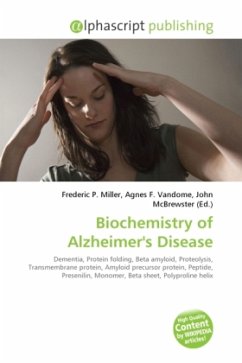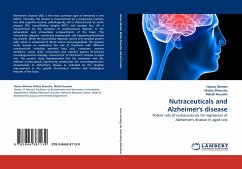The biochemistry of Alzheimer's disease (AD), one of the most common causes of adult dementia, is as yet not well understood. It has been identified as a protein misfolding disease due to the accumulation of abnormally folded amyloid beta protein in the brains of AD patients. Amyloid beta, also written A , is a short peptide that is an abnormal proteolytic byproduct of the transmembrane protein amyloid precursor protein (APP), whose function is unclear but thought to be involved in neuronal development. The presenilins are components of proteolytic complex involved in APP processing and degradation. Amyloid beta monomers are soluble and contain short regions of beta sheet and polyproline II helix secondary structures in solution,though they are largely alpha helical in membranes; however, at sufficiently high concentration, they undergo a dramatic conformational change to form a beta sheet-rich tertiary structure that aggregates to form amyloid fibrils.








